FTSE 100 Live 21 June: Retail sales surge past expectations, Palantir shares slide
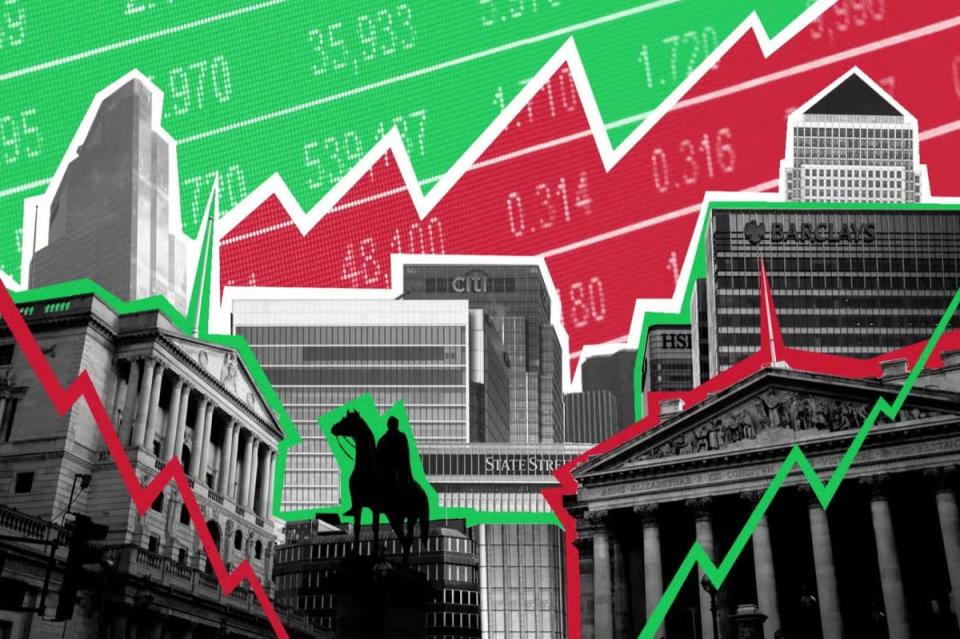
Britvic shares are in the spotlight after the drinks firm emerged as a takeover target for Carlsberg.
The J2O and Robinsons maker said it had rejected a £3 billion approach by the Danish firm.
Elsewhere, retail sales have offered more evidence the UK economy has turned the corner.
FTSE 100 Live Friday
Britvic rejects Carlsberg offer
Retail sales beat expectations
Consumer confidence improves
FTSE 100 closes down 0.4%
16:47 , Simon Hunt
The FTSE 100 has ended the day’s session down 0.4% to 8,237 points, though it has closed out the week up on last week by a little over 1%.
On the FTSE 250, Britvic has been the clear winner with its shares up around 10% on news that it had rejected a £3 billion takeover offer from Danish brewing giant Carlsberg. Britvic shares are now up around a third since the start of the year.
The clearest signs yet that the UK’s economy has turned a corner emerged today as a flurry of fresh data pointed to robust consumer demand and renewed optimism over growth prospects.
UK retail sales for May surged past market expectations, rising 2.9% month on month and coming in well ahead of the consensus of 1.8%, while consumer confidence rose for the third consecutive month to the highest in two and a half years.Danni Hewson, head of financial analysis at AJ Bel, said: “People have started to feel the benefit of falling inflation and are feeling more confident about spending the few extra pennies they’re getting in their pay packets thanks to the cut in National Insurance and the increase in the National Living Wage.
“Interest rates might have been held in May and again in June, but there has been movement in the housing market after a surge in homes being put up for sale over Easter. Whether people are moving or staying put, they are finally making moves to replace big ticket items they’ve been making do with over the past couple of years.
“Consumer confidence will be crucial if the economy is to deliver the kind of growth all political parties say is needed to fund their manifesto promises. But the old saying about fixing the roof whilst the sun shines holds true, especially in the UK, and a wet summer could change everything.”
Here’s one last look at your key market data:
Octopus Energy to repay £3bn of taxpayer money used for Bulb takeover
16:00 , Simon Hunt
Octopus Energy will pay the Government nearly £3 billion to reimburse the public money it received to take over collapsed energy supplier Bulb.The repayment will see the next Government get an early windfall, with the payment promised by September, and it means almost all of the costs of temporarily nationalising Bulb in 2021 will have been recovered by the public purse.Bulb collapsed in 2021 after wholesale prices surged above the price cap set by regulator Ofgem, meaning suppliers were forced to sell energy at a loss.
The Government took temporary control to keep the lights on for Bulb’s 1.5 million customers under a new process called a special administration regime (SAR).

City Spy: JPMorgan has had enough of emails
15:23 , Simon Hunt
Ask any Fleet Street hack about the state of their inbox, and you’ll at once be greeted with a grimace. I get hundreds of emails a day, they’ll say, and most of them are utter tosh (top-notch newsletters notwithstanding). What I wouldn’t give to have my account shut down for good.
But the journalism world is not the only one maddened by the drudgery of email. The view is echoed by Manuela Veloso, JPMorgan’s head of AI Research, who says she too is fed up with the deluge of messages she has to respond to.
Speaking at the Evident AI Symposium on the top floor of the Cheesegrater yesterday, Veloso told an audience of bankers she’s planning a cunning solution...
City Voices: Why fraud prevention strategies are backfiring for businesses
15:10 , Simon Hunt
Every business in the world has one thing in common—the need to accept payments for their services or goods. However, it’s never as simple as it sounds, especially when you consider the role fraud plays. Global losses from online payment fraud are projected to soar past $362 billion in the next five years. In the UK alone, businesses took a hit of over £173.8 million in the first half of 2023 due to card-not-present fraud.
While establishing strict rules to eliminate all fraudulent payments seems obvious , it comes with a cost. The price tag attached to specialised fraud prevention services can be prohibitive for businesses operating on thin margins. Even though these checks only cost a few pence to initiate, that can be enough to wipe out a significant percentage of a sale's profit margin.
Stringent fraud rules also block legitimate customers from completing their transactions—a situation known as a 'false decline.' If you’ve ever experienced one, you’ll know how frustrating it is. More often than not, it causes customers to abandon their purchase and can even risk alienating customers, potentially deterring future transactions with the merchant.
Spirit Aerosystems up on Boeing partnership
14:48 , Simon Hunt
US stocks slipped in the opening minutes of trade on Wall Street as investors weighed fresh data about the health of the US economy.
The S&P 500 opened lower by 6.40 points to 5,466.77, while the Nasdaq Composite dropped 40.58 points to 17,681.01 after the opening bell.
Shares in Spirit AeoroSystems were among the biggest risers, up as much as 5% on the back of news that the company had struck a new deal with Boeing.
Meanwhile, Palantir shares slid on the back of a recommendation to sell by analysts at Monness, Crespi, Hardt & Co citing a “gluttonous valuation.”
Bitcoin continues retreat to lowest price in a month
13:45 , Simon Hunt
Bitcoin has fallen another 2% today, continuing its gradual weeks-long retreat to have fallen around 10% over the past month.
Though the cryptocurrency remains up about 40% since the start of the year after hitting fresh highs in March.
Neil Roarty, analyst at investment platform Stocklytics, said: “Investors appear genuinely split on where the leading cryptocurrency goes next.
“Perhaps the most bearish indicator is the on-chain analysis which suggests that some of Bitcoin’s biggest whales are cashing in. By some measures, the largest BTC holders have together sold more than $1 billion worth of the coin over the last couple of weeks. If they know something the rest of the market doesn’t, it won’t be long until others follow the example.”
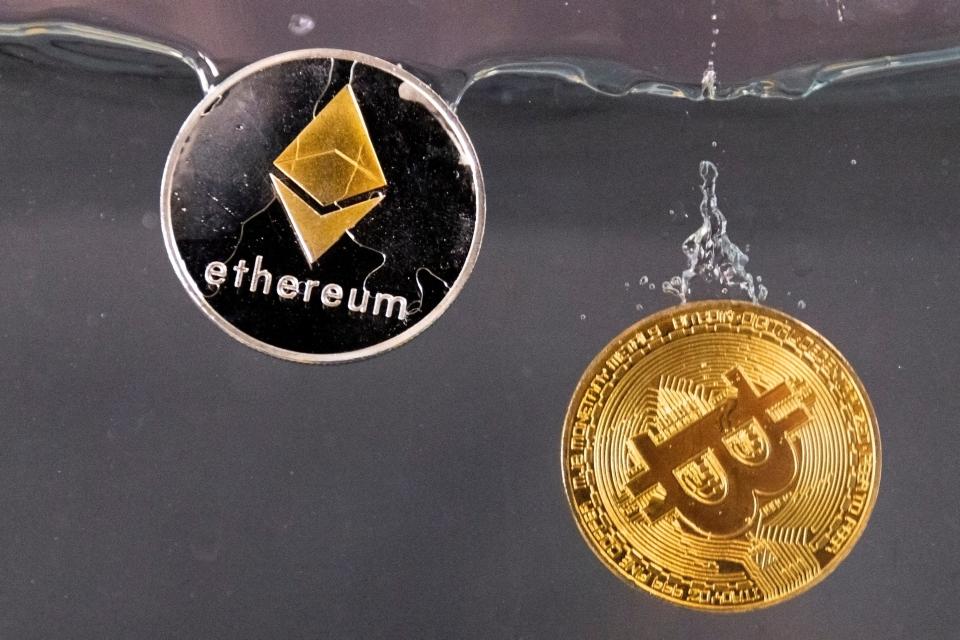
SoftBank's Son vows to champion super intelligence in curious investor speech
13:13 , Bloomberg
SoftBank Group Corp.’s big-talking founder Masayoshi Son is back, this time with plans to bring about an era of artificial super-intelligence.
Son sketched out ambitions to help create AI thousands of times smarter than any human, making his most grandiose pronouncements since the Japanese conglomerate began taking steps to shore up its finances following a series of ill-timed startup bets. Son, sounding both more energized and more reflective than he has in years, talked Friday about a future when Arm Holdings chips support a thriving ecosystem of robots and powerful data centers that can collectively cure cancer, clean houses and play with children.
Son, at times visibly overtaken with emotion, talked about how he wanted to change the world before he leaves it for good. The 66-year-old invoked his late friend Steve Jobs, saying their frequent conversations often left him in tears when he realized his legacy would pale in comparison with the Apple Inc. co-founder’s. But after agonizing about his next move over the past year, during which Son’s father passed away, the billionaire said he woke up with an epiphany Friday morning.
Lunchtime update: Shares fall as Britvic pares earlier gains
12:28 , Simon Hunt
Midway through the day’s trading session in London, the FTSE has dropped around half a percent while the pound has slipped against the dollar.
Shares in Britvic have retreated from their big surge this morning after it was revealed that the drinks maker had rejected a £3 billion offer from Carlsberg. They are now up about 5% now but Carlsberg shares are still down more than 7%.
Shares in Ocado have recovered following some of the earlier losses made yesterday on the back of troubles over a partnership in Canada. They are now up about 3% as Ocado prepares to exit the FTSE 100.
Here’s a look at the key market data:
Amazon weighs charging $5-10 for Alexa services -- Reuters
11:42 , Simon Hunt
Amazon is mulling charging its customers between $5-10 per month as it introduces new features to its Alexa service, according to a report just out by Reuters.
The new features, which will include AI functionality, are set to be ready by August and customers may end up facing a paywall to access them.
An Amazon spokesperson said they will “enable even more proactive, personal and trusted assistance for customers.”
It comes as Amazon gears up to celebrate the 10th anniversary of Alexa, with the speech-assisted smart device having first been launched in November 2014. Well over 500 million Alexa-enabled devices have since been sold.

City comment: Economic boost is too little, too late for Sunak
11:10 , Simon Hunt
The Bank of England could have cut interest rates yesterday, in what would have been a small boost to Rishi’s Sunak increasingly vanishing chances of having a good election.
The Monetary Policy Committee, facing the reality that inflation has fallen to the target rate of 2% for the first time in three years, had a conundrum.
If it had cut was that it effectively interfering in politics?
The statement reports: “The Committee noted that the timing of the general election on 4 July was not relevant to its decision at this meeting, which would as usual be made on the basis of what was judged necessary to achieve the 2% inflation target sustainably in the medium term.”
Hm. Protesting too much? Trying to pre-emptively fend off complaints from the Daily Mail that its decision to hold was politically motivated? Perhaps a little.
What seems clear is that Keir Starmer and co are waking into an economy that is heading smartly upwards.
Retail sales and consumer confidence are improving, we report today.
Government finances are in slightly better shape than perhaps feared. The government borrowed £15 billion in May to make ends meet, which is bad, but it was £700 million less than economists expected.
So perhaps Labour really could afford to spend a bit more than it reckons on public services.
Especially when the Bank does cut rates, either in August or September, but either way just after it has secured victory at the ballot box.
This week JP Morgan ditched its cap on banker bonuses. If you aren’t a banker, this may not delight you, but it is part of the mood music that says the City is poised for a bounce that will boost tax revenue.
Critics says Sunak should have waited until November for an election. He’d have lost anyway, but it might have looked a lot less painful.
Standard Chartered makes foray into crypto trading in London -- Bloomberg News
10:06 , Bloomberg
Standard Chartered is setting up a trading trading desk for Bitcoin and Ether, people familiar with the matter said, making it one of the first global banks to enter spot cryptocurrency trading.
The new crypto desk is close to starting operations and will be part of the bank’s FX trading unit, two of the people said, asking not to be named discussing private information. It will be run from London, according to one person.
Banks including Goldman Sachs Group Inc. have been trading cryptocurrency derivatives for years, but strict regulations have kept them from dealing directly in the underlying assets.
Rosy retail numbers raise hopes for strong second half
09:56 , Simon Hunt
The clearest signs yet that the UK’s economy has turned a corner emerged today as a flurry of fresh data pointed to robust consumer demand and renewed optimism over growth prospects.
UK retail sales for May surged past market expectations, rising 2.9% month on month and coming in well ahead of the consensus of 1.8%, while consumer confidence rose for the third consecutive month to the highest in two and a half years.
The rosy figures add to Wednesday’s news that inflation had fallen to the Bank of England’s 2% target for the first time in nearly three years and are in stark contrast to gloomy April numbers, with poor weather helping retail sales sink 2.3%, well worse than analysts had predicted.
But the data was overshadowed by ballooning government borrowing as figures released today showed the UK’s public debt rose to its highest level since 1961, with net borrowing hitting £15 billion for the month of May, an increase of £0.8 billion according to the Office for National Statistics. That was £0.6 billion below the estimates of the Office for Budget Responsibility, but nonetheless underscored the increasingly constricted fiscal wiggle room a future government will have after the election.
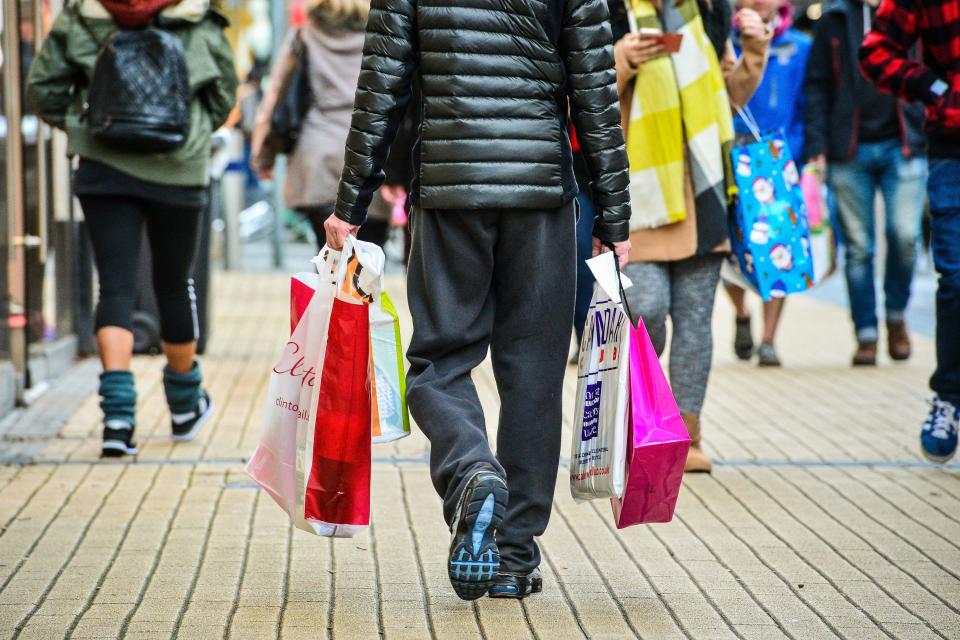
Ocado rallies in final FTSE 100 session, water firms higher
09:56 , Graeme Evans
Relegated Ocado today led the FTSE 100 index as its spell as a blue-chip company ended with another big share price swing.
The retail and technology business bowed out 4% or 11.3p higher at 321.3p, having fallen 12% yesterday after Sobeys of Canada delayed a new warehouse launch.
Alongside Ocado, St James’s Place ended its decade in the top flight down 1.5p to 550p.
The FTSE 100 index fell 21.01 points to 8251.45, with London Tech Week host Informa among the top performers after a rise of 4.6p to a four-year high of 864.4p.
The digital-focused group, which owns academic publisher Taylor & Francis, said it had “changed gears” this year with underlying revenues growth of 10.1%.
Severn Trent rose 32p to 2473p and United Utilities by 18.1p to 1011.5p after JP Morgan lifted its targets on the water firms to 2700p and 1250p respectively.
Discounter B&M moved the other way despite today’s strong retail sales figures, off 7.5p to 469.6p after Morgan Stanley moved to an “underweight” stance.
Britvic fizzes as Carlsberg falls flat
08:56 , Simon Hunt
Shares in Brivic fizzed this morning after the soft drinks maker said it had rejected a takeover offer from Danish brewer Carlsberg.
The stock rose 15% to 1165p, climbing most of the way towards the offer of 1,250p per share Carlsberg proposed earlier this month, which the J2O and Robinson’s maker said “significantly undervalued” the company and prompted its board to unanimously reject the deal. Britvic’s shares are now up some 40% since the start of the year, giving it a market cap of nearly £3 billion.
Carlsberg’s offer was the second in as many weeks after it previously approached Britvic with a 1,200p proposal, which was also rejected. The news boosted shares in Britvic rival Fevertree, which climbed 5% this morning, while Carlsberg shares sunk by more than 8%.
Britvic last month wowed shareholders after it posted an 11% rise in sales to £880 million in the six months to the end of March, boosted by sales growth of more than a third in Brazil, one of its biggest overseas markets and a more than doubling in demand for its oat milk drink Plenish.
Informa acceleration boosts shares, Britvic surges in FTSE 250
08:26 , Graeme Evans
Britvic shares have jumped 154p to 1169p after the FTSE 250-listed soft drinks firm disclosed it had rejected a £3 billion takeover approach by Carlsberg.
The proposal at 1250p a share compared with Britvic’s price of 785p in April and 961p at the start of this month.
The FTSE 100 index is 4.13 points lower at 8268.33, with the FTSE 250 index 20.50 points higher at 20,519.22.
Informa shares rose 7.2p to 867p in the top flight after the host of London Tech Week and owner of academic publisher Taylor & Francis said it was trading towards the upper end of its 2024 guidance range
Chief executive Stephen Carter said: “The Informa Group has changed gears and we are now delivering 10%+ growth."
Britvic rejects £3 billion offer from Carlsberg
07:57 , Simon Hunt
London listed drinks maker Britvic has said it rejected a takeover offer from Danish drinks giant Carlsberg.
The offer of 1,250p per share represents a more than 20% premium on Britvic’s current share price and would have valued it at more than £3 billion. It followed an earlier proposal of 1,200p per share.
The Robinsons and J2O maker said: “The Board together with its advisers carefully considered the Second Proposal, and concluded that it significantly undervalues Britvic, and its current and future prospects. Accordingly, the Board unanimously rejected the Second Proposal on 17 June 2024.”
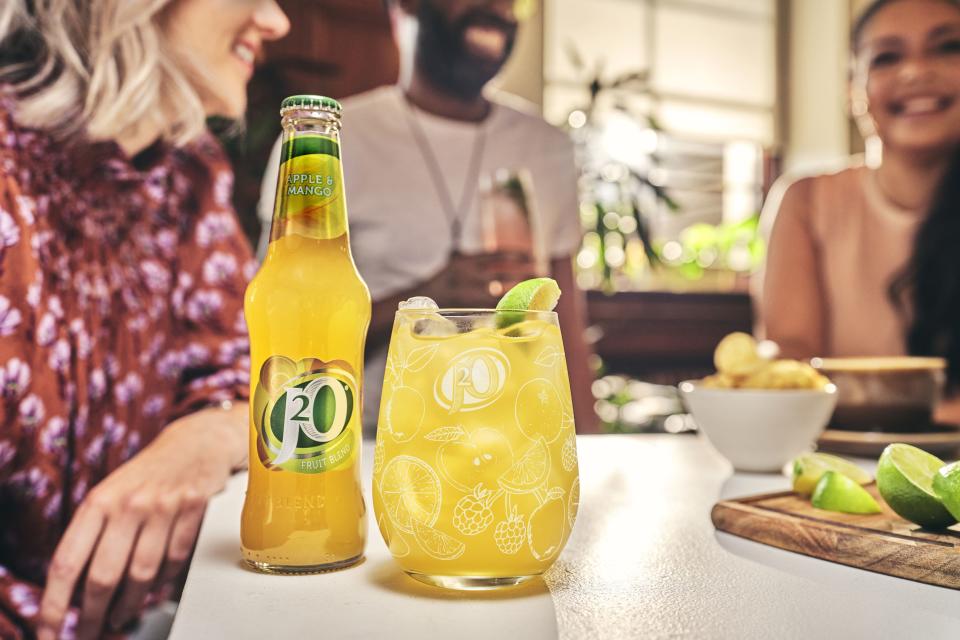
Retail sales beat expectations
07:35 , Simon Hunt
UK retail sales have surged past market expectations in the latest sign the economy is turning a corner.
May’s retail figures were up 2.9% month on month, well ahead of the consensus of 1.8%. That helped the pound rise to a session high.
Textile, clothing and footwear was the strongest performing category, up 5.4% on the previous month, while household goods stores rose 3.5%. Sales at food stores rose more slowly, up 1.2%, in signs of cooling food inflation.
It follows data showing consumer confidence had risen for the third consecutive month to the highest in two and a half years.
Erin Brookes, European Retail and Consumer Lead at Alvarez & Marsal, said: “After retail sales took a tumble last month, we’re starting to see substantial growth again as consumers pick up spending.
“As we move into summer, the industry is hoping for a sustained rebound. Landmark summer events like the Euro 2024 football tournament and Taylor Swift's Eras tour arriving in the UK are anticipated to further stimulate consumer spending.”
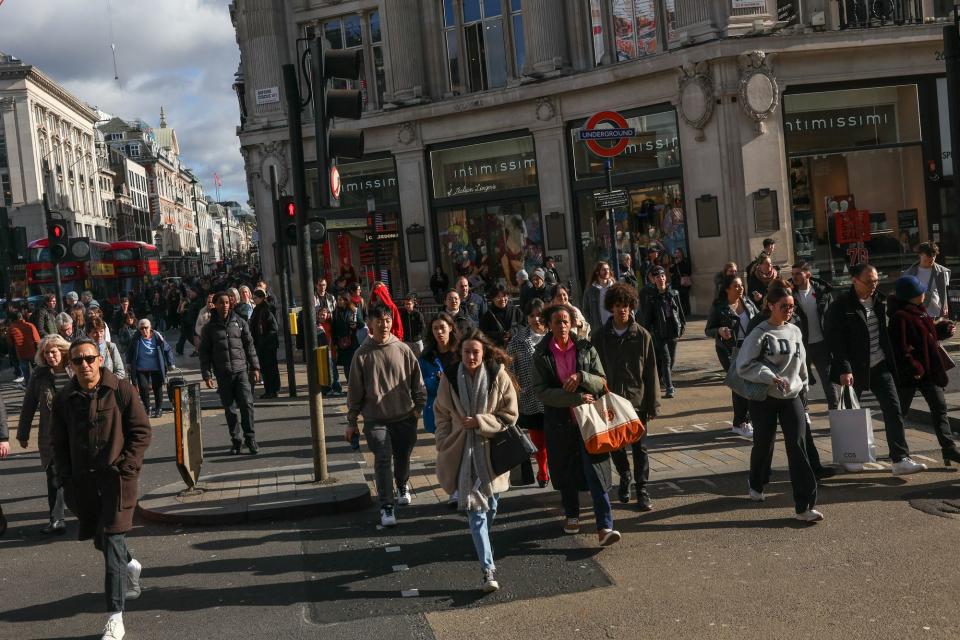
Recovery in consumer confidence continues
07:29 , Graeme Evans
Optimism about the UK economy has driven GfK’s long-running consumer confidence Index to its third monthly increase since March.
The overall index score increased three points to minus 14 in June, with the reading on the economic situation over the next 12 months up six points and the major purchase index ahead by three points.
The only downward response came on personal finances in the next 12 months, which declined three points but remains in positive territory overall.
Consumer confidence has recovered significantly since the record low of minus 49 reached in September 2022.
GfK client strategy director Joe Staton said: “Consumers like financial certainty, and this has to be the cornerstone if we are to see confidence break out into positive territory."
FTSE 100 seen flat, US tech stocks and Asia markets struggle
07:15 , Graeme Evans
London’s stronger week is set to finish on a flat note after futures trading pointed to an unchanged opening for the FTSE 100 index at 8274.
The progress follows another divergent performance by Wall Street’s main benchmarks after the Dow Jones Industrial Average closed 0.8% higher but the S&P 500 index lost 0.25% and the Nasdaq Composite fell 0.8%.
Tech stocks were out of favour after their strong recent run, leaving Nvidia shares down 3%, Arm Holdings off 8% and Apple 2% lower. Microsoft finished flat to reclaim its position as the world’s most valuable public company.
In Asia, it was a poor session as the Shanghai Composite continued its run of weekly losses with a fall of 0.2% and the Hang Seng index lost 1.4%.
Brent Crude this morning traded at $85.74, representing a rise of 3% this week.
Recap: Yesterday's top headlines
06:51 , Simon Hunt
Good morning from the Standard City desk.
They were the challenger banks of their time. But today the era when supermarkets could be considered potentially serious rivals to the likes of Lloyds, Barclays and NatWest looks to have petered out.
Sainsbury’s yesterday said it was transferring its loan, credit card and retail deposit portfolios to NatWest, while Tesco said in February it was selling its retail banking business to Barclays.
The low key withdrawal from the field of play is in stark contrast to the high hopes and hoopla at launch — both in 1997 — when the grocers reckoned that the strength of their brands would help them make rapid inroads into a sector notorious for dismally low levels of customer satisfaction.
And to be fair, the supermarkets have done reasonably well. Tesco has over five million customer accounts and last year made a £148 million operating profit. Sainsbury’s operations are smaller, but still significant, with around one million customer accounts included in the sale, and profits last year from all financial services of £29 million.
Both brands regularly appear at the top of best-buy tables but have failed to achieve the critical mass needed to be a serious threat to the established “legacy” banks. That historic role is now handed over to the fast-growing digital only players such as Monzo and Starling.
The 27-year experiment in brand stretch was not exactly a failure but does shine a light on just how hard it is to shake up Britain’s unloved retail banking sector.
~
Here’s a summary of our other top stories from yesterday:
Pollster YouGov issues shock profit warning despite being in the busiest year for elections on record
Lord Cruddas’s City spread betting firm CMC Markets sees profits jump 21% to £63m as markets recover
Tate & Lyle buys US food gums maker CP Kelko for $1.4 billion
Packaging giant DS Smith sees profits fall by a quarter as demand for cardboard boxes falls in tougher economic environment
Bridgepoint make £626 million takeover bid for London based Alpha FMC consultancy
Energean sells Egypt, Italy and Croatia portfolios for up to $945 million, to Carlyle

 Yahoo Finance
Yahoo Finance 